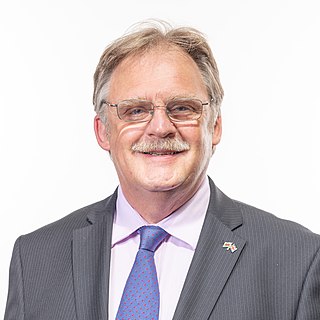
David Thomas Charles Davies is a British politician who was Secretary of State for Wales from 2022 to 2024. He was the Member of Parliament (MP) for Monmouth from 2005 to 2024. A member of the Conservative Party, he chaired the Welsh Affairs Select Committee from 2010 to 2019. Davies also served as Parliamentary Under-Secretary of State for Wales from 2019 to 2022, and as Member of the Welsh Assembly (AM) for Monmouth from 1999 to 2007.

Laura Anne Jones is a Conservative politician who has been the Member of the Senedd (MS) for the South Wales East electoral region since July 2020, having previously held the same seat as an Assembly Member (AM) in the National Assembly for Wales between 2003 and 2007. Jones also served as a county councillor for the Wyesham ward in Monmouthshire County Council from 2017 to 2022.

Mark Allan Isherwood is a Welsh Conservative Party politician, who has served as a Member of the Senedd (MS) for the North Wales region since 2003. He is currently Shadow Counsel General and Shadow Minister for Housing and Planning. Isherwood has held a number of Shadow Ministerial positions for the Welsh Conservatives since he was first elected, at various points holding portfolios for Finance, Social Justice, North Wales, Europe, Housing, Communities and Local Government, among others.

Roderick Richards was a British politician who was leader of the Welsh Conservatives from 1996 to 1999, and a Welsh Assembly member (AM) for the North Wales region from 1999 until 2003.

Jonathan Morgan, is a Welsh Conservative politician, who served as a Conservative Assembly Member (AM) for South Wales Central from 1999 to 2007 and AM for Cardiff North from 2007 to 2011. In the National Assembly elections in 2011 he was beaten by Labour's candidate Julie Morgan, wife of former First Minister Rhodri Morgan. He is currently chair of Cwm Taf Morgannwg University Health Board and Chairman of the Welsh NHS Confederation.

Darren David Millar is a Welsh Conservative politician who has served as the Member of the Senedd (MS) for Clwyd West since 2007.
The Welsh Conservatives, also known as the Welsh Conservative Party, is the branch of the United Kingdom Conservative Party that operates in Wales. At Westminster elections, it is the second-most popular political party in Wales by vote share, having obtained the second-largest share of the vote at every general election since 1931. In Senedd elections, the Conservatives are currently the second-most supported party but have at times been third. As of 2024, they hold none of the 32 Welsh seats in the Parliament of the United Kingdom, and 16 of the 60 seats in the Senedd.

Andrew Robert Tudor Davies CBE is a Welsh politician serving as Leader of the Opposition and Leader of the Welsh Conservative Group in the Senedd since 2021, having also held both roles on previous occasions. He has been a Member of the Senedd (MS) since 2007.

Paul Windsor Davies is a British politician who has served as Member of the Senedd (MS) for Preseli Pembrokeshire since 2007. He served as Leader of the Welsh Conservatives and Leader of the Opposition in Wales from June 2018 to January 2021, resigning after possible breaches of Welsh COVID-19 rules. He had previously been Deputy Leader from 2011 to 2018 and Acting Leader in 2011 and 2018.

Russell Ian George is a Welsh Conservative Party politician who has been the Montgomeryshire Member of the Senedd (MS) since the 2011 election.

In the Senedd, the Leader of the Opposition is the leader of the Official Opposition, the largest political party that is not in the Welsh Government. The Leader of the Opposition leads and appoints members of the Shadow Cabinet and as such is sometimes styled as the Shadow First Minister of Wales.

Paul Davies became the Leader of the Opposition in Wales after being elected as Leader of the Welsh Conservatives on 27 June 2018 and named his Shadow Cabinet in July.

Ieuan Wyn Jones became Leader of the Opposition in Wales after being elected as President of Plaid Cymru, the Official Opposition in the National Assembly for Wales, on 3 August 2000. Jones had previously served in these roles in an acting capacity on the behalf of his predecessor Dafydd Wigley from December 1999 to February 2000. He formed his shadow cabinet on 9 August and, like his predecessor, appointed himself Shadow First Secretary of Wales and Shadow Assembly Secretary for Finance. Members of his shadow cabinet were initially known as shadow assembly secretaries until October 2000. From that month, members were known as shadow ministers, with Jones's titles also changing to Shadow First Minister of Wales and Shadow Minister for Finance, after a similar change was made to the names of ministerial posts in Rhodri Morgan's coalition government between Labour and the Liberal Democrats. Jones's shadow cabinet was dissolved after the formation of a coalition government between Plaid Cymru and Morgan's Labour Party on 19 July 2007.
The 1999 Welsh Conservatives leadership election was held in August 1999 to elect the leader of the Welsh Conservative Group in the National Assembly for Wales. The election was triggered by the resignation of Rod Richards after the Welsh Conservative Party failed to endorse his appointment of David TC Davies as acting leader after Richards was charged for inflicting grievous bodily harm, which he was later cleared of in 2000. Nick Bourne, who the party had appointed as acting leader in Davies' place, was elected unopposed as the new leader of the Welsh Conservative Group in the National Assembly as the only candidate nominated for the leadership by group members.

Rod Richards, the leader of the Welsh Conservative Group in the National Assembly for Wales, formed his frontbench team of party spokespeople on 13 May 1998. Richards had led his party into the 1999 National Assembly for Wales election after being elected as leader of the Welsh Conservative Group in 1998.

Mike German, the leader of the Welsh Liberal Democrat Group in the National Assembly for Wales, formed his second frontbench team of party spokespeople on 8 May 2003 after the dissolution of his party's coalition government with Rhodri Morgan's Welsh Labour following the 2003 National Assembly for Wales election. Richards had already formed a frontbench team before entering coalition, when his party became an opposition party after the 1999 National Assembly for Wales election before forming the coalition with Labour in October 2000.

Mike German, the leader of the Welsh Liberal Democrat Group in the National Assembly for Wales, formed his frontbench team of party spokespeople on 13 May 1999. German had led his party into the 1999 National Assembly for Wales election after being elected as leader of the Welsh Liberal Democrat Group in 1998. This was his first frontbench team in the assembly, with it dissolving after the party entered government in October 2000. He formed a second frontbench team after his party returned to opposition in May 2003.

Ieuan Wyn Jones, the leader of Plaid Cymru, formed his frontbench team of party spokespeople in the National Assembly for Wales on 25 May 2011 after the dissolution of his party's coalition government with Rhodri Morgan and Carwyn Jones' Welsh Labour following the 2011 National Assembly for Wales election. Jones had previously led a shadow cabinet before entering coalition from 2000 to 2007, when his party had served as the Official Opposition since the 1999 National Assembly for Wales election.

Nick Bourne became Leader of the Opposition in Wales after the Welsh Conservatives became the largest party that was not a part of the government in the National Assembly for Wales after the 2007 Assembly Elections. This was because the second largest overall party, Plaid Cymru, had entered into government as part of the One Wales coalition with Welsh Labour.

Andrew RT Davies became Leader of the Opposition in July 2011, after he was elected leader of the Welsh Conservatives, which formed the second largest party bloc in the National Assembly for Wales after the 2011 National Assembly for Wales election.






















